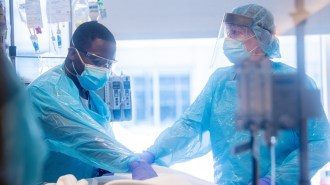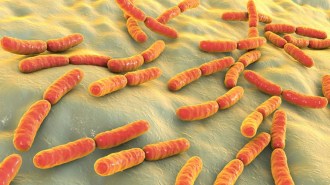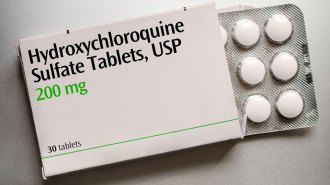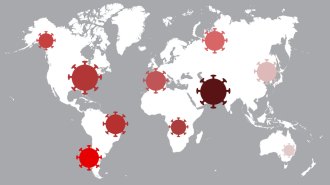Health & Medicine
-
 Health & Medicine
Health & MedicineThe FDA has canceled emergency use of hydroxychloroquine for COVID-19
The malaria drug is unlikely to work as an antiviral and its risks don’t outweigh benefits in use against the coronavirus, the agency rules.
-
 Health & Medicine
Health & MedicineA critically ill COVID-19 patient just got a double lung transplant
A young woman whose lungs could not recover from the coronavirus infection is doing well after a double lung transplant.
-
 Life
LifeScientists want to build a Noah’s Ark for the human microbiome
Just as the Svalbard Global Seed Vault protects global crop diversity, the Microbiota Vault may one day protect the microbes on and in our bodies.
-
 Health & Medicine
Health & MedicineNo, you can’t hear the difference between sick and healthy coughs
A study shows humans can’t distinguish between the sound of a cough from someone with an infectious disease and someone with a tickle in the throat.
-
 Health & Medicine
Health & MedicineHow often do asymptomatic people spread the coronavirus? It’s unclear
A WHO official said people without COVID-19 symptoms rarely spread the virus, but there’s a lot that researchers don’t yet understand.
-
 Health & Medicine
Health & MedicineLockdowns may have averted 531 million coronavirus infections
Policies that kept residents at home and closed businesses were largely effective at slowing the pandemic’s spread, two studies suggest.
-
 Health & Medicine
Health & MedicineTaking hydroxychloroquine may not prevent COVID-19 after exposure
Hydroxychloroquine didn’t protect health-care workers from getting sick after being exposed to someone with COVID-19, a new study shows.
-
 Health & Medicine
Health & MedicineWhat parents need to know about kids in the summer of COVID-19
So far, evidence suggests children don’t often get severely ill from COVID-19, but there’s more to learn about their role in its spread.
-
 Genetics
GeneticsGenetic risk factors for Alzheimer’s also raise the risk of getting COVID-19
People who have the APOE4 genetic variant appear to be more vulnerable to the disease, but it’s unclear why.
-
 Health & Medicine
Health & MedicineWastewater could provide up to a week of warning for a COVID-19 spike
A new study adds to evidence that sewage may serve as an early warning signal that the coronavirus has hit a community.
-
 Health & Medicine
Health & MedicineInfecting people with COVID-19 could speed vaccine trials. Is it worth it?
To accelerate vaccine development, some experts argue we should purposefully infect volunteers with the coronavirus. Others warn of the risks.
-
 Health & Medicine
Health & MedicineIs the coronavirus mutating? Yes. But here’s why you don’t need to panic
Some studies claim there are new strains of the coronavirus, but lab experiments are needed to see if mutations are changing how it infects cells.